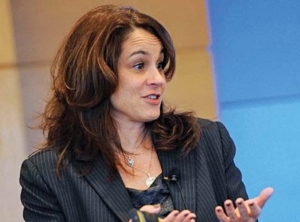
Wharton’s acceptance rate was the second-lowest in the U.S. in 2017, at 7%
Wharton is most well-known for churning out finance and banking graduates. Yet, today, its fasting growing segment for job placement is in tech.
With the growing influence of tech in the business world, Wharton is expanding on its traditional business studies with a greater emphasis on innovation and technology, analytics, and the global economy.
“Historically, most students took a first job in banking or a related arena, but that percentage has dipped below half,” Lori Rosenkopf, vice dean and director of the Wharton undergraduate division, says. “Slightly below a quarter go into consulting. The fastest growing segment is tech: this percentage has risen from 3% to 15% during my tenure.”
See the below interview to learn more about how Wharton is developing its curriculum, changes among business students, and advice for students interested in studying business.

Lori Rosenkopf of The Wharton School
What are some of the most innovative things happening now at Wharton and business education in general?
Rosenkopf: There is an increasing amount of project-based coursework with emphasis on critical thinking and unstructured problem-solving.
At Wharton, for our new undergraduate curriculum, we are developing a range of integrative capstone course options for seniors that involve group projects that focus on applying the knowledge and skills they have gained to analyzing and solving business problems. These options will span areas such as analytics, entrepreneurship, nonprofit management, and alternative investments, so students will pursue topics about which they are most passionate.
What about in the curriculum? How has that developed?
Rosenkopf: Two of our key goals when we were developing our new curriculum were to enhance the development of communication, teamwork, and interpersonal skills and to provide greater emphasis on innovation and technology, analytics, and the global economy.
As a result, we extended leadership coursework from a single first-semester course to four modular courses spanning freshman to senior year. We also added requirements in ‘Technology, Innovation and Analytics’ and ‘Global Economy, Business and Society’ which allow students to explore these applications in the academic department of their choosing. In addition, we developed a new concentration in business analytics.
How has Wharton been able to combat the misconception that every student studies finance and banking?
Rosenkopf: We have implemented a few changes and new programs to expose students to a wider range of opportunities. For instance, Wharton 101, the gateway course in the new Leadership Journey sequence, introduces the wide range of business pathways students can pursue. The Wharton Industry Exploration Program (WIEP) is a travel program that takes students to different cities to study various industries. One of the highlights of my tenure has been visiting San Francisco each January with 40 students in our WIEP course that includes panels on the tech sector, site visits, and alumni mixers.
How have students changed or not changed during your time in business education?
Rosenkopf: In many ways, students over the years share similarities; for example, they all continue to be highly motivated. Today’s students, however, care more deeply about the interconnectedness of business and society. We’ve seen quite a rise of interest in social impact and social enterprise coursework and co-curricular projects.
Just this year, seven of the nine seniors who won the University of Pennsylvania’s President’s Engagement and Innovation Prizes were Wharton students. These prizes support projects designed to make a positive difference in the world, and our three prize-winning teams will be building a furniture bank in Chicago, helping recyclers earn a living wage in India, and developing a medical device to prevent glaucoma-induced blindness.
What advice do you have for high school students and their parents that are interested in studying business in college?
Rosenkopf: Explore your interests and figure out what motivates and excites you. Develop your passions; they will guide you as you choose from a wide range of possibilities.
DON’T MISS: THE BEST CITIES FOR BUSINESS & FINANCE GRADS or NEW DATA: TOP FEEDER SCHOOLS TO WALL STREET











Questions about this article? Email us or leave a comment below.